Aloe vera is turning into a house favorite in the plant world. This plant does not need much specialized care and is often considered low maintenance.
However, does aloe vera actually need fertilizer to thrive?
Aloe vera may need fertilizer during its growing season or if it’s a mature plant. The type of fertilizer best suited to your aloe plant depends on several factors.
Below we discuss the factors that determine whether aloe vera needs fertilizer, the best fertilizers to use, and more.

Table of Contents
Factors That Determine Whether to Fertilize Aloe Vera
The Particular Growing Conditions of Your Aloe Vera Plant
Generally, most fertilizers can be beneficial for aloe vera plants. However, depending on your growing environment, some fertilizers may be better suited than others.
For example, suppose you are growing aloe vera in a pot or container indoors. A nutrient-rich soil mixed with both organic and synthetic fertilizers might be better.
These fertilizers can provide the necessary nutrients for aloe vera plants to thrive providing they receive adequate water and light.
Alternatively, suppose you are growing aloe vera outdoors. In that case, it might be best to use a slow-release fertilizer like compost or worm castings.
The aloe vera plants absorb nutrients from these fertilizers. Slow-release fertilizers release their nutrients over time. In turn, this prevents nutrient runoff from affecting nearby plants and ecosystems.
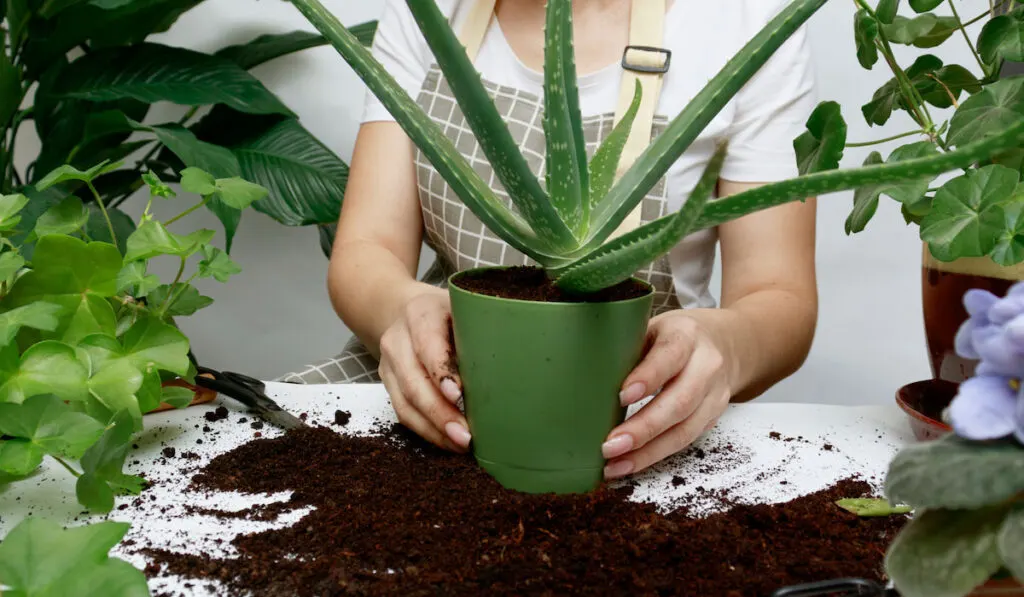
The Type of Fertilizer You Are Using
Experts recommend that aloe vera plants receive nitrogen-rich fertilizers every few months. Moreover, they advise fertilization during the plant’s active growing season.
Fertilization promotes healthy growth, ensuring your aloe vera receives the nutrients it needs to thrive.
There are a variety of different fertilizers that can work well for aloe vera, including:
- Liquid fertilizers.
- Granular fertilizers.
When choosing a fertilizer for your aloe vera plant, look for one without harsh chemicals or additives. Harsh chemicals can harm your plants.
Age and Health of Your Aloe Vera Plant
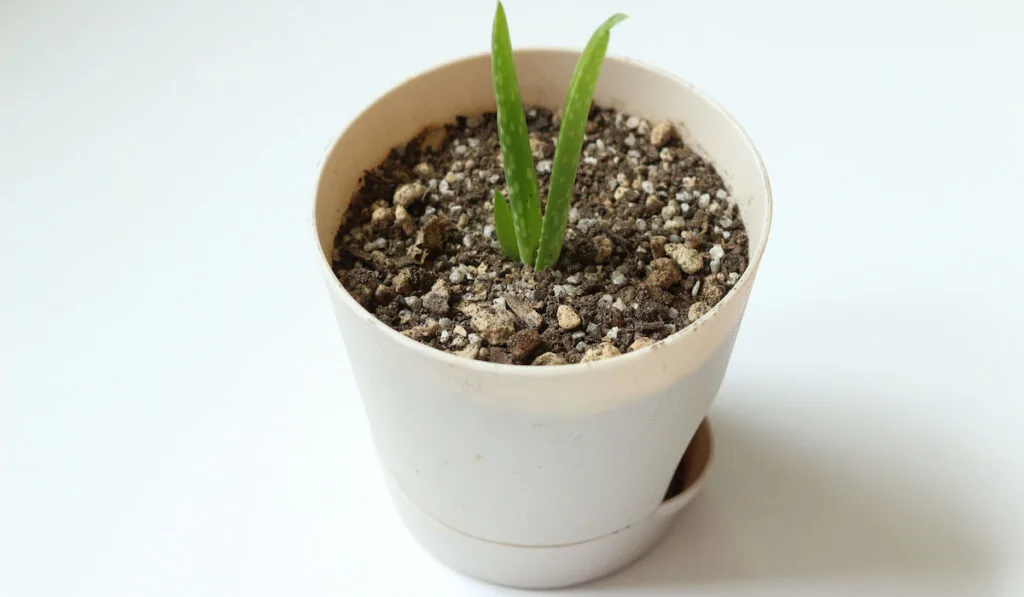
If the plant is young or unhealthy, it’s best to avoid fertilizing it altogether.
A young plant’s roots are delicate and can be damaged by too much fertilizer.
Also, sick plants cannot absorb nutrients, leading to leaf burn.
On the other hand, your aloe plant can handle a little fertilizer if it is mature and healthy. Start with a light application and increase the amount over time.
Time of Year
Avoid fertilizing your aloe vera plant during winter. This is when the plant is dormant and not growing.
Fertilizing during this period can damage the roots or stimulate growth when the plant should be resting.
The best time to fertilize your aloe vera plant is in spring or summer when it’s growing.
What Helps Aloe Vera Grow?
Aloe vera is native to Africa but can be grown worldwide under the right conditions.
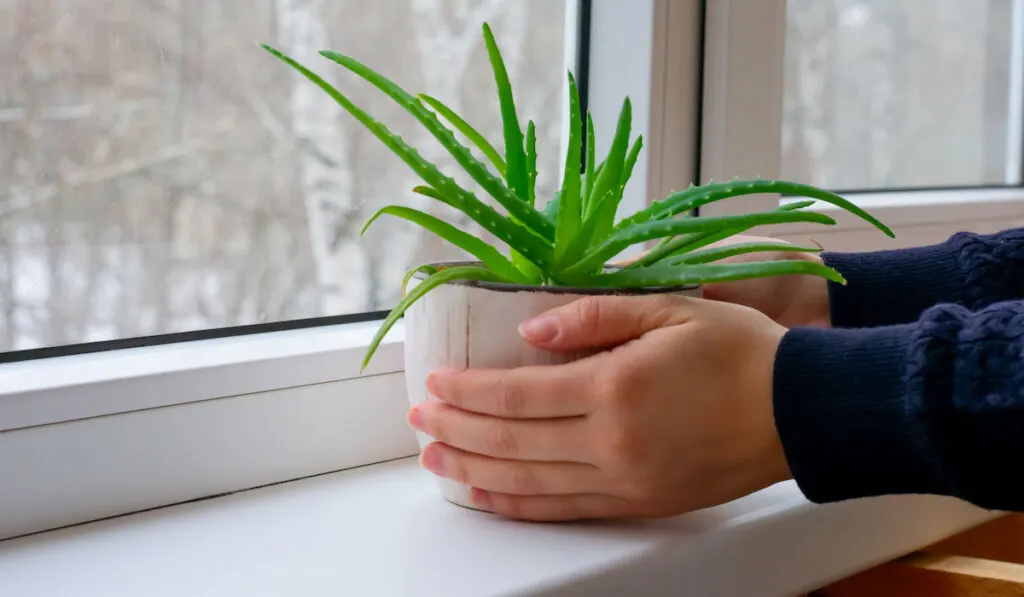
Here are tips to help your aloe vera plant to thrive:
- Aloe vera likes lots of sunlight, so place it in a spot where it will get at least six (6) hours in the sun per day.
- The plant prefers well-drained soil, so allow the soil to dry out before watering.
- Aloe vera is prone to root rot, so avoid overwatering.
- If you live in a cold climate, it’s best to grow aloe vera indoors to keep it warm during winter.
These tips should enable you to enjoy the benefits of this exciting and valuable plant.
What Fertilizer Is Best for Aloe vera?
Like most people, we think that any old fertilizer will do when it comes to feeding aloe vera plants. But the truth is not all fertilizers are equal.
If you want your aloe vera to thrive, you must choose the right fertilizer for the job.
So, what’s the best fertilizer for aloe vera?
Here are our top picks:
1. Miracle-Gro Indoor Plant Food
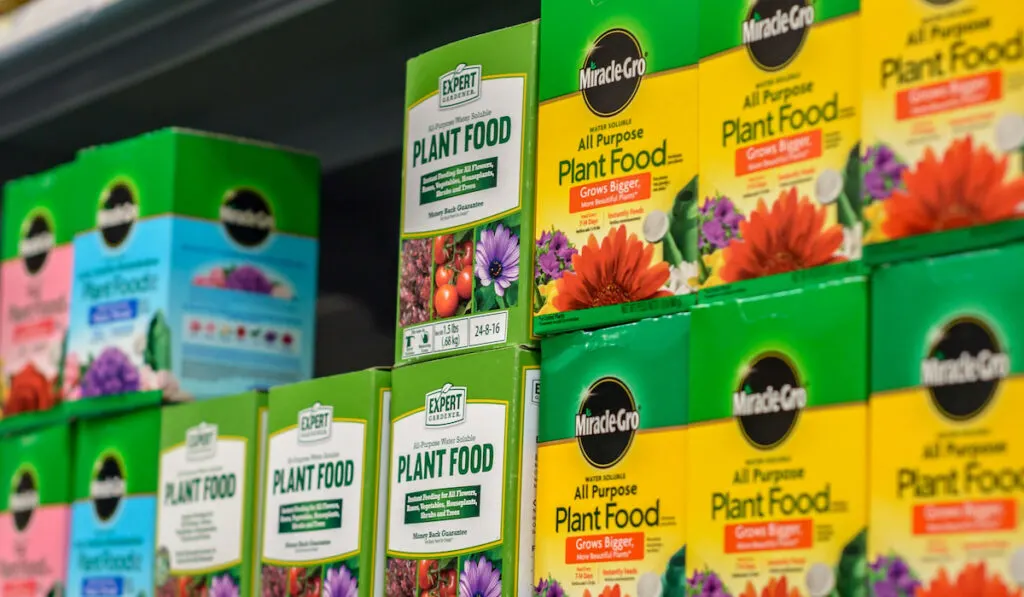
This fertilizer is rich with micronutrients to help promote vigorous growth in your aloe vera plants. It’s also easy to use; mix it with water and apply it every two weeks.
2. FoxFarm Happy Frog Potting Soil
This potting soil is perfect for aloe vera plants, as it is rich in organic matter and nutrients.
It also includes mycorrhizae fungi, which help to improve root efficiency and promote plant health.
3. General Hydroponics Floranizer
This is a complete fertilizer perfect for all stages of plant growth. It contains all the essential nutrients aloe vera needs to thrive, including:
- Nitrogen
- Phosphorus
- Potassium
Plus, this fertilizer is suitable for use with hydroponic systems.
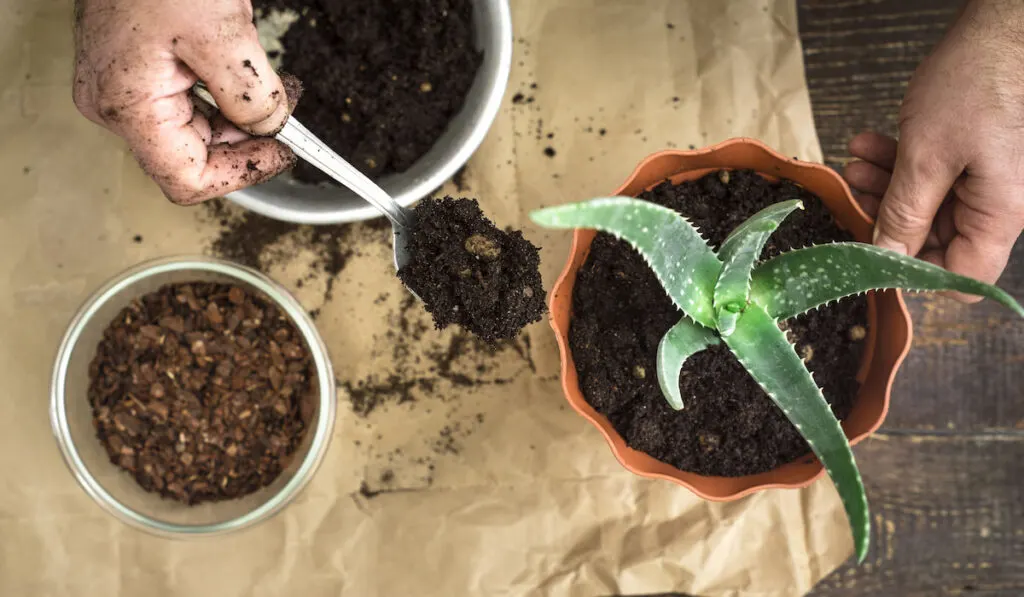
3 Aloe Vera Fertilizing Tips
Leafy Tip 1: If you’re thinking of giving aloe vera a little boost with fertilizer, go ahead – but don’t overdo it. Light-feeding fish emulsion or compost tea every few months should be plenty.
Leafy Tip 2: If you see the leaves starting to turn yellow, that’s a sign that you’ve been too heavy-handed with the nutrients, and you should back off for a while.
Leafy Tip 3: Your local nursery or cooperative extension office will have more specific recommendations for fertilizing succulents if you need them.
Does Aloe Vera Need Soil Additives?
Aloe vera suffers when the soil in its container is dense and compacted. Plants in this situation will benefit from repotting and the addition of these soil amendments to the new potting mix.
Vermiculite
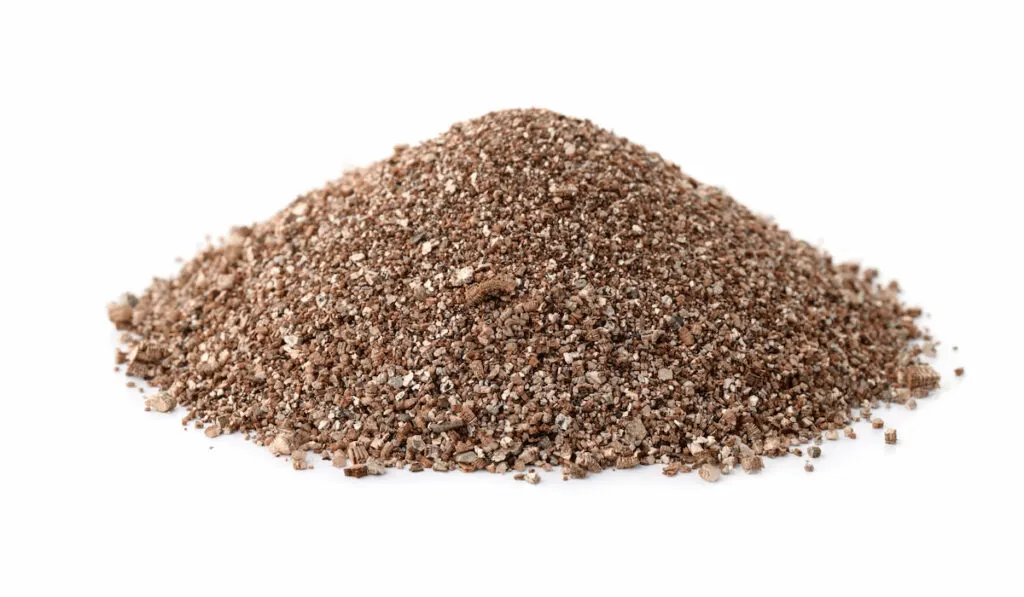
This is an excellent soil amendment for aloe vera plants, as it helps to improve drainage and aeration while providing some essential nutrients. It’s also perfect for use in container gardens.
Perlite
Like vermiculite, perlite is excellent for improving drainage and aeration while providing essential nutrients. It’s also lightweight and easy to handle, making it ideal for container gardens.
Does Aloe Like Coffee Grounds?
Many people believe that aloe does not like coffee grounds.
However, evidence suggests that adding coffee grounds to your aloe’s soil helps it grow and flourish.
The coffee grounds:
- Provide essential nutrients that help promote healthy growth and vibrant color.
- Add beneficial microbes that help keep the soil healthy and well-balanced.
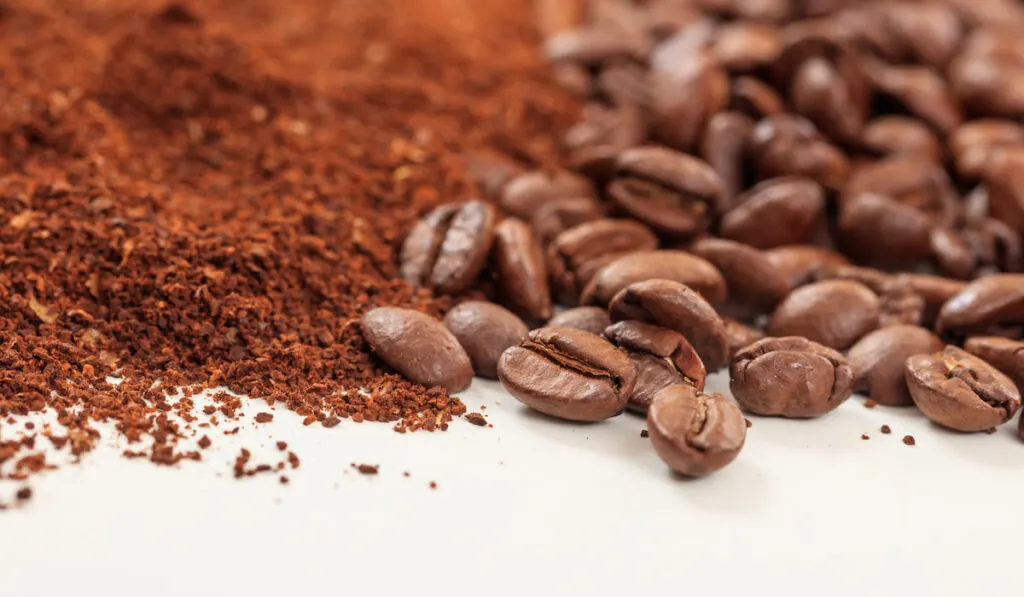
According to Dr. Linda Chalker-Scott, an Extension Urban Horticulturist and Associate Professor at Washington State University, bacteria and fungi found in decomposing coffee grounds prevent pathogenic fungi from affecting the plant.
Another potential benefit of adding coffee grounds to your aloe plant is that they help to keep the soil around your plant moist.
Many gardeners have found that mixing coffee grounds into their soil creates a natural moisture-retaining agent.
This helps prevent water loss and keeps your aloe happy and healthy.
Mulching tip: Do not apply thick layers of coffee grounds as mulch. Coffee grounds can interfere with soil moisture and aeration due to their delicate texture and easy compaction.
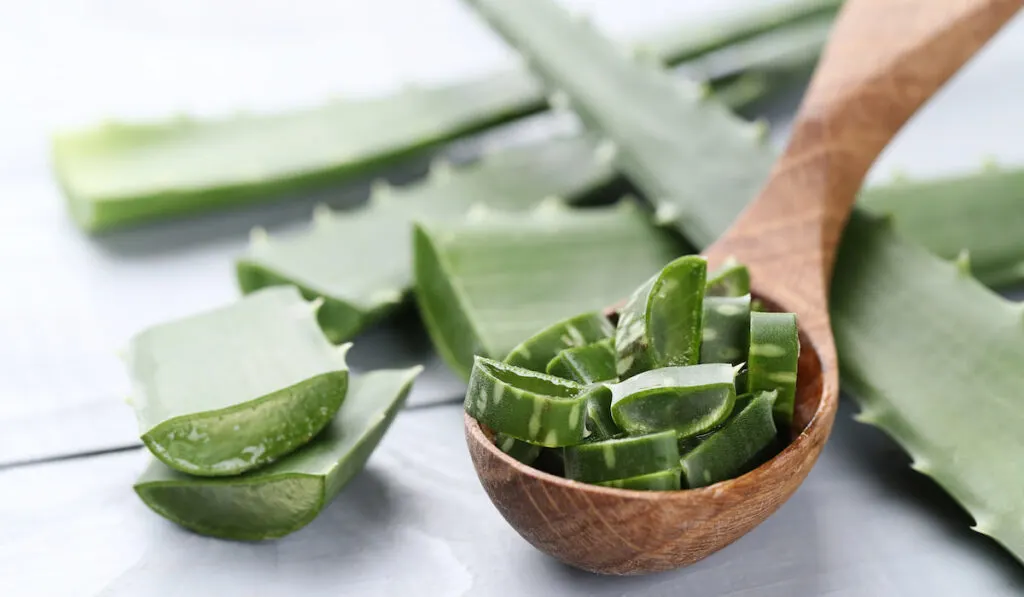
7 Easy Steps to Make Aloe Vera-Based Fertilizer at Home
Aloe vera has uses in natural skin care products and has many benefits for humans.
However, did you know aloe vera is also used as a fertilizer?
This easy seven-step guide will outline how you can use aloe vera to create your own homemade fertilizer.
1. First, you will need to gather some Aloe vera leaves. Give them a thorough wash to remove any debris or dirt.
2. Cut the leaves into small pieces, then place them in a blender or processor.
3. Add water to the blender or food processor, and blend or process the mixture until it becomes a smooth liquid.
4. Pour the mixture into a glass jar or container and seal it.
5. Store the mixture in a cool place for twenty-four (24) hours to allow the flavors to blend.
6. After 24 hours, add one cup of water to the mixture and stir well.
7. Your aloe vera fertilizer is now ready to use. Dilute it with water and apply it to your plants as needed.
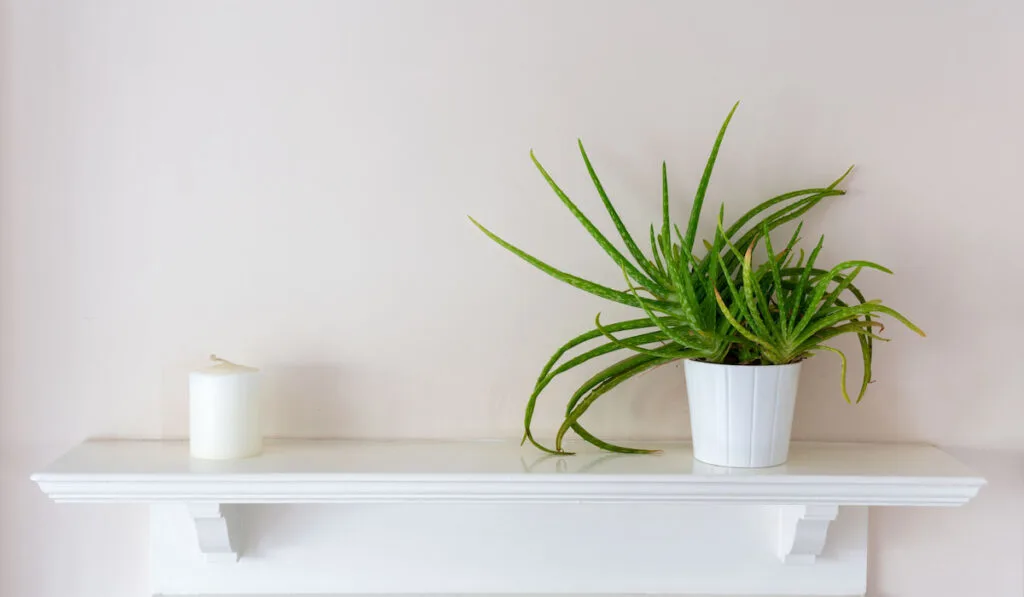
Putting It All Together
Aloe vera is a low-maintenance plant that requires little effort to keep alive. However, giving your aloe vera the occasional fertilizer boost will help it grow strong and healthy.
On the other hand, over-fertilizing can burn the roots of aloe plants and damage or kill the plant.
You can make your own aloe vera-based fertilizer home with a few ingredients. However, plenty of commercial fertilizers are available if you are not quite the DIY type.
Remember to read the labels carefully and follow the directions, otherwise, you might do more harm than good.
Do you have a favorite aloe plant in your home?
Share it in the comments below.
Resources
- Dastagir, G., & Hussain, S. (2014, August 26). Effect of Fertilizer Treatments on the Growth of Aloe vera L., 1-9. http://mail.pakbs.org/pjbot/PDFs/47(SI)/18.pdf
- Gallagher, E. (n.d.). How to Grow and Use Aloe Vera. One Green Planet. Retrieved November 30, 2022, https://www.onegreenplanet.org/lifestyle/how-to-grow-and-use-aloe-vera/
- Garden Answer. (2018, August 2). Aloe Vera Care Guide. YouTube. Retrieved November 30, 2022, from https://www.youtube.com/watch?v=iVFE4MWzyCg&ab_channel=GardenAnswer
- How to Grow Aloe Vera in a Small Apartment. (2022, July 23). Arktivate. Retrieved November 30, 2022, from https://organicfertiliser.sg/how-to-grow-aloe-vera-in-a-small-apartment/
- Lutz, A. (2022, September 28). How to Grow and Take Care of an Aloe Plant (2022 Guide). Architectural Digest. Retrieved November 30, 2022, from
https://www.architecturaldigest.com/reviews/home-products/how-to-take-care-of-an-aloe-plant - Miracle-Gro. (n.d.). How to Grow Aloe Vera | General Aloe Vera Planting & Care Tips. Miracle-Gro. Retrieved November 30, 2022,
https://www.miraclegro.com/en-us/library/indoor-gardening/growing-aloe - Scott, L. C. (n.d.). Washington State University Extension. Using Coffee Grounds in Garden and Landscapes, 1-6.
http://pubs.cahnrs.wsu.edu/publications/wp-content/uploads/sites/2/publications/fs207e.pdf - Scott, L. C. (2009, Winter). Coffee Grounds-will they perk up plants? Myths, Miracles…or Marketing, 3-4. https://s3.wp.wsu.edu/uploads/sites/403/2015/03/coffee-grounds.pdf
